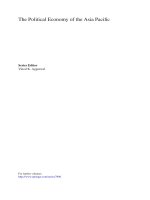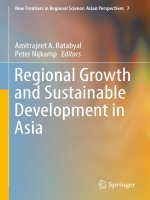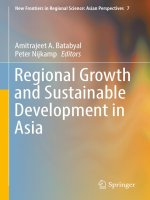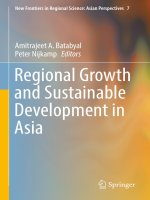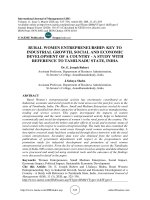Economic growth and economic development 41
Bạn đang xem bản rút gọn của tài liệu. Xem và tải ngay bản đầy đủ của tài liệu tại đây (65.22 KB, 1 trang )
Introduction to Modern Economic Growth
South Korea and Singapore manage to grow, while Nigeria failed to take advantage
of the growth opportunities? If physical capital accumulation is so important, why
did Nigeria not invest more in physical capital? If education is so important, why
did the Nigerians not invest more in their human capital? The answer to these
questions is related to the fundamental causes of economic growth.
We will refer to potential factors affecting why societies end up with different technology and accumulation choices as the fundamental causes of economic
growth. At some level, fundamental causes are the factors that enable us to link the
questions of economic growth to the concerns of the rest of social sciences, and ask
questions about the role of policies, institutions, culture and exogenous environmental factors. At the risk of oversimplifying complex phenomena, we can think of the
following list of potential fundamental causes: (i) luck (or multiple equilibria) that
lead to divergent paths among societies with identical opportunities, preferences and
market structures; (ii) geographic differences that affect the environment in which
individuals live and that influence the productivity of agriculture, the availability
of natural resources, certain constraints on individual behavior, or even individual
attitudes; (iii) institutional differences that affect the laws and regulations under
which individuals and firms function and thus shape the incentives they have for
accumulation, investment and trade; and (iv) cultural differences that determine
individuals’ values, preferences and beliefs. Chapter 4 will present a detailed discussion of the distinction between proximate and fundamental causes and what types
of fundamental causes are more promising in explaining the process of economic
growth and cross-country income differences.
For now, it is useful to briefly return to South Korea and Singapore versus Nigeria, and ask the questions (even if we are not in a position to fully answer them
yet): can we say that South Korea and Singapore owe their rapid growth to luck,
while Nigeria was unlucky? Can we relate the rapid growth of South Korea and
Singapore to geographic factors? Can we relate them to institutions and policies?
Can we find a major role for culture? Most detailed accounts of post-war economics
and politics in these countries emphasize the growth-promoting policies in South
Korea and Singapore– including the relative security of property rights and investment incentives provided to firms. In contrast, Nigeria’s postwar history is one of
27



